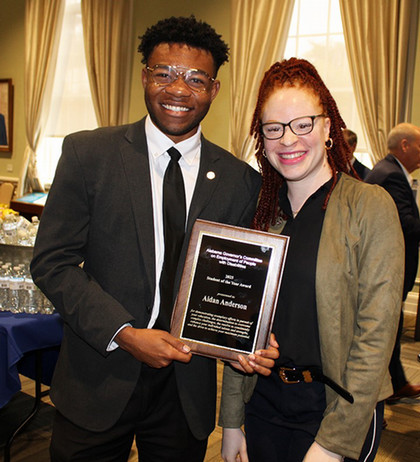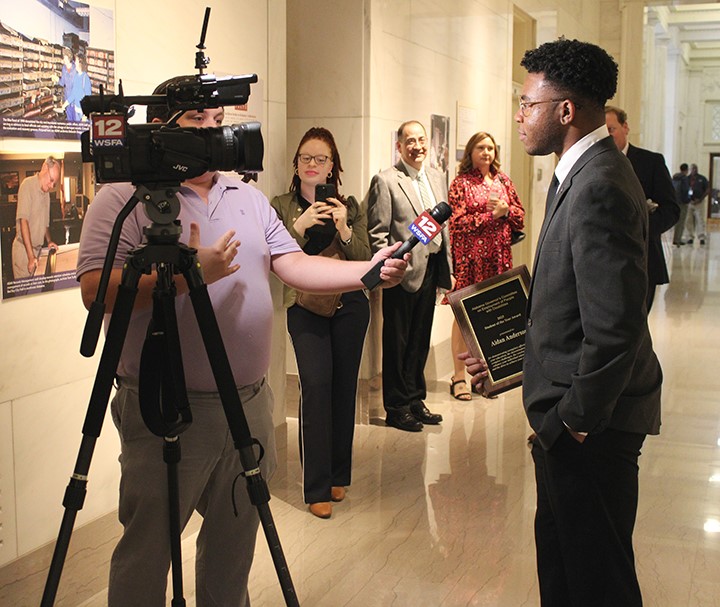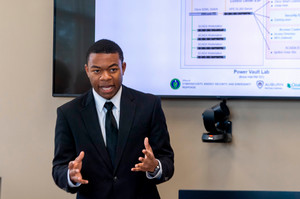‘I lost my sight, but gained vision’: Senior in CSSE named Student of the Year from the Governor's Committee on Employment of People with Disabilities
Published: Oct 29, 2025 8:20 AM
By Joe McAdory
Aidan Anderson woke up one morning after his freshman year and everything seemed unusually bright. The computer science and software engineering student rubbed his eyes, then rubbed it off — believing he’d spent too much time staring at his computer screen.
A few days later, he nearly pulled into oncoming traffic, unable to see a car directly ahead of him.
He knew something was off.
Visiting an optometrist in Mobile, Anderson expected to be prescribed his first pair of glasses. Instead, he struggled to read beyond the second row of the vision chart. Tests revealed that Anderson’s peripheral vision was fine, but he was blind to objects directly in front of him.
Within days, he underwent CT scans and MRIs. Two scans showed concerning shadows and doctors suspected the worst.
“Everyone thought I had a brain tumor because it was the most likely explanation,” Anderson said.

“For weeks, I lived with that terrifying possibility, trying to focus on my internship, juggling medical appointments and refusing to let uncertainty stop my life. Then a specialist at UAB’s Callahan Eye Clinic looked at things differently. The scans were scary, but something didn’t add up. My blood work was normal with no signs of infection and I didn’t fit the cancer profile, so he ordered a long-shot genetics test.”
Results revealed Anderson had a rare variation of Leber's hereditary optic neuropathy, a condition affecting roughly one in 50,000. His optic nerve was damaged, leaving him with severe central vision loss while his peripheral sight remained sharp.
The diagnosis still threatened everything he'd worked toward: a promising career in cybersecurity, an engineering degree from Auburn University and the college experience he'd dreamed about since high school.
“I did not always think that there was a silver lining. When I initially had this, I was stuck in this rut for like solid six months, just like, ‘God, why me? Why would you face me with this challenge? Why am I being put in this position?’ I went to the number one high school in the state. I had always been an academic. I had always stayed out of trouble. I was focused on that successful path of becoming an engineer, going to Auburn and doing great things here.”
But Anderson refused to quit.
When assistive technology arrived from the Alabama Institute for the Deaf and Blind, he learned to use magnification devices and screen readers. When exams became impossible to read, he found solutions.
“I refused to not be a technology guy,” Anderson said. “I refused to not be a leader. I refused to leave my apartment and not have the collegiate lifestyle that my peers had."

That determination didn’t just keep Anderson enrolled… it's propelled him to the top of his field. Now a senior with plans to graduate in summer 2026, Anderson works as a research and development engineer at the McCrary Institute for Cyber and Critical Infrastructure Security, hunting for vulnerabilities in America's power grid. He previously served as a threat intelligence analyst at J.B. Hunt, predicting cyber threats before they materialized.
Anderson was recognized at a special ceremony on Monday, Oct. 27, by Alabama Gov. Kay Ivey and the Alabama Department of Rehabilitation Services (ADRS) with the state's Student of the Year award from the Governor's Committee on Employment of People with Disabilities.
"Aidan and the other winners were recognized because of their many accomplishments and tremendous talents," said ADRS Commissioner Jane Elizabeth Burdeshaw. "They remind us of the opportunities that are available if we value the talents of all Alabama’s citizens. We are so proud of Aidan and look forward to seeing the impact of his leadership in the future.”
As Alabama’s lead state agency for disability services and resources, the ADRS provides students and adults with disabilities access to no-cost programs such as assistive technology and customized accommodations developed by rehabilitation engineers, as well as vocational counseling, mentorships, internships and job-readiness and placement programs. ADRS works closely with colleges and universities across the state to help students like Anderson gain the support and resources they need to reach their full potential.
For more information, visit: ADRS | Alabama Department of Rehabilitation Services.
McCrary Institute Associate Director and Chief Operating Officer Nick Sellers considered Anderson to be “one of the most extraordinary young people I’ve ever met.”
“He’s brilliant, humble and driven by a purpose bigger than himself,” Sellers said. “His potential has no ceiling, and the beauty of it is he always turns the spotlight toward his team. That’s the kind of person everyone can rally behind.”
Anderson has a message to others facing disabilities: stop waiting for obstacles to move and start moving through them yourself.
“Half the battle is being willing to just be hard-headed,” he said. “Have you ever thought about it as… this obstacle is going to be here until I happen to it? Or, this exam isn't going to go through me… I'm going to go through this exam?
“I lost my sight, but gained vision. I was able to see the larger picture, one that shows I can do anything I put my mind to.”

Anderson credits the Alabama Institute for the Deaf and Blind for providing critical technology, Auburn University’s accessibility programs for understanding his unique needs and his family for unwavering support. He also advocates forcefully for systemic change in how universities approach disability services.
“Real change starts with how institutions approach accessibility,” he said. “Too often, students with disabilities are expected to show up with a fully formed plan for how to navigate their challenges. But is it really access if you must autopsy every failure just to get the support you need?
“Colleges should be proactive and talk to disabled students and faculty, build support systems based on lived experience. The state’s motto is, ‘We dare defend our rights,’ and accessibility falls under the pursuit of happiness. Every student deserves that.”
Media Contact: , jem0040@auburn.edu, 334.844.3447
Aidan Anderson, center, with Alabama Gov. Kay Ivey, left, and Alabama Department of Rehabilitation Services Commissioner Jane Elizabeth Burdeshaw.

